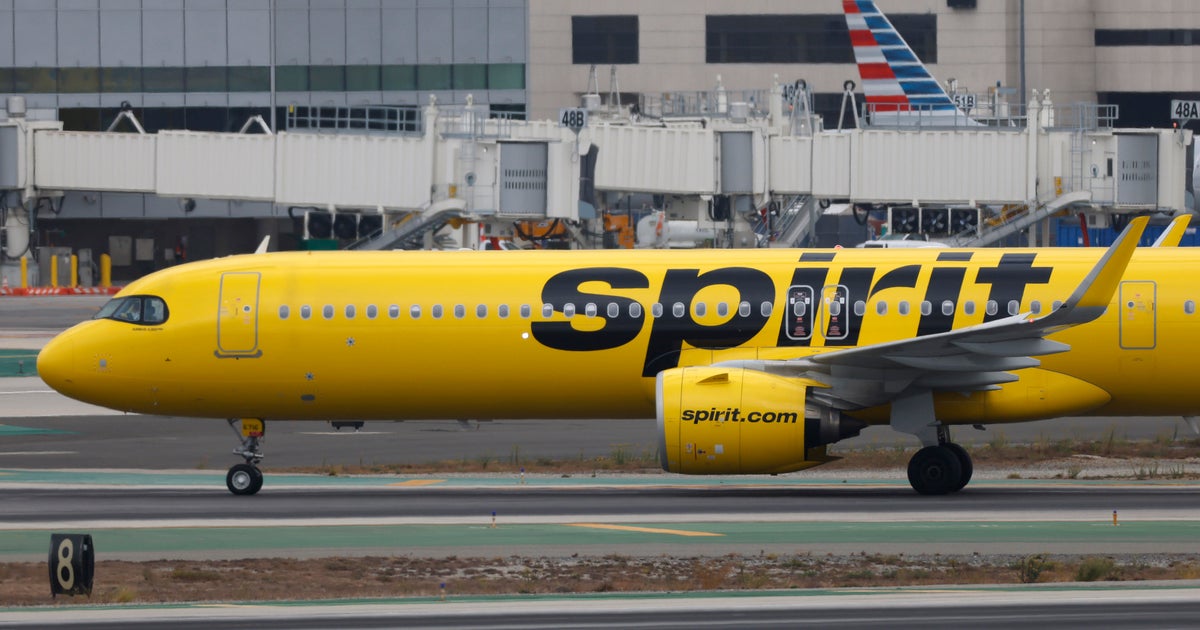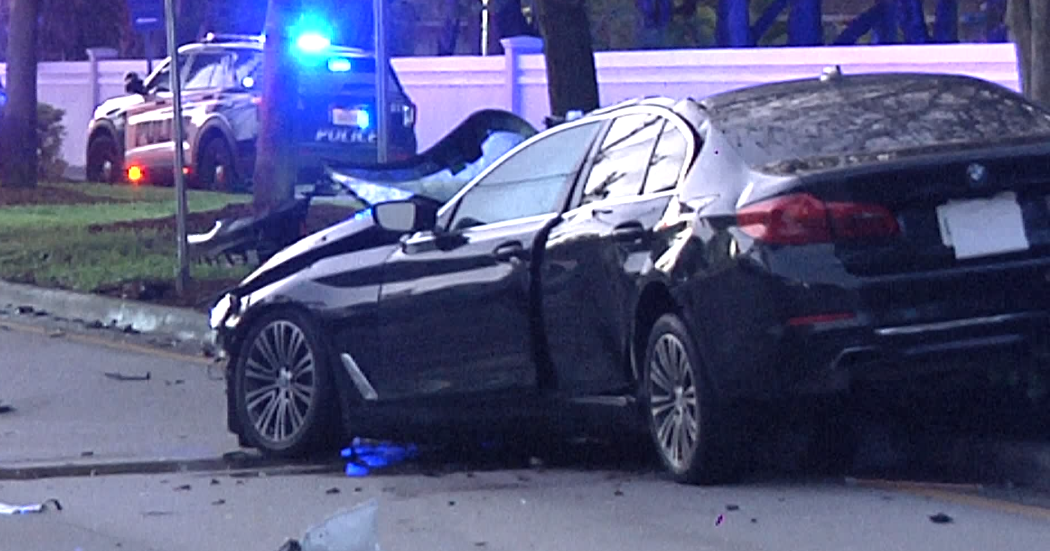In His Own Words: Rick Folbaum On Covering 9/11 Terrorist Attacks In NYC
MIAMI (CBSMiami) -- Ask someone who lived through 9/11 in New York City to tell you their story, and I'll bet you anything it starts off with "It was such a beautiful early morning." It's become cliché. But that's because it's true. The calmest, clearest early morning I can remember. Ever.
I'm working for Fox News in New York City. I'm standing with my camera man, Adam, enjoying the sunshine and waiting to be let in to the Times Square theme restaurant Mars 2112, where we are set to record segments for an upcoming special on, of all things, UFOs. That's when we get word that a small plane has struck one of the World Trade Center towers. The assignment desk tells us to wait there. A sound engineer, John, is on his way to meet us and then we'll head down about two miles south to see what's going on.
We get in our SUV, turn on the radio and wait for John. The news reports are still focused on this small plane, somehow veering off course. It sounds like a tragic accident. I'm sure the pilot is dead. And any passengers he may have had. I wonder about people inside the tower. Adam and I listen to the reports. Where is John? We really need to get down there. Then we hear on the radio that the other tower had been struck. What? Within seconds, my cell phone rings.
It's my mother. "Don't go down there," she pleads. "It's my job, mom. I'll be careful and I'll call you as soon as I can."
Call waiting. My girlfriend (now wife). "Rick, don't go."
"Honey," I tell her, "you're a reporter. You know I have to go. I'll be OK." I promise to call her too, as soon as I can. John finally arrives and we're suddenly screaming down the West Side Highway, following a procession of emergency vehicles. In seconds, we can see both towers, with thick black smoke and flames shooting from the upper floors.
Maybe my girlfriend and mother are right. What business do I have heading to this scene? Fire and police and EMTs were one thing. But they're trained for this, I think. My only training was as a journalist, and I'd never set foot in a war zone before. That was about to change.
Soldiers, not yet combat tested, must wonder how they'll do when the time comes. Will they charge forward or retreat? As my colleagues and I drive closer and closer to the smoldering buildings, I instruct Adam who is driving, to pull over. We're two blocks north of the North Tower, on Murray Street and I tell him we're close enough. I'm scared. The West Side Highway is absolute pandemonium. Thousands of people have come outside from nearby offices, apartments and schools to look up at the burning skyscrapers. Everyone is in a collective state of shock and disbelief.
Adam is in full on work mode. He sets up his tripod and begins shooting. On our last contact with our assignment desk, we'd been told that we were the roving crew, charged with filming whatever we could. Someone would be meeting up with us to get our video tapes and run them over to our satellite truck a few blocks east, where they'd be fed back to Fox's midtown studios and broadcast. Adam gets some establishing shots. John gets the microphone ready for me. All I can do is look up at the burning landmarks in front of me.
Adam says, "OK, Rick. Let's get you on camera."
"What?" I ask.
"Talk to people," Adam says.
I tap a woman on her shoulder. I ask her to describe what she, what we, are looking at. Dumb reporter question. Firemen in full gear march past us, heading towards the buildings. "How do you think they're going to get the fire out?" I ask the woman, another dumb reporter question. Not even the firefighters know that. Finally, we chat for a few minutes on camera, this woman and I, about how they need to bring in those special planes that they use for forest fires, the ones that can dump fire-retardant chemicals on tough to reach flames. That, we agree, is the only way to tackle this.
Then, I hear a voice from the crowd yell, "They're jumping!" And in seconds I spot two people, holding hands, leaping to their deaths from more than a hundred stories up. Then another. And another. Adam says, "Rick, talk. Do your job. Be a reporter."
But at that moment, during what will no doubt be the biggest story I will ever cover in my entire career, I am speechless. I cannot reporter. I cannot do my job. I cannot believe my eyes. All I can do is think about the dozens of people I'm watching; people who have decided to determine for themselves how they are going to die. People who have decided that jumping from one of the tallest buildings in the world is a better option than burning to death inside.
"We've got to get you on camera, Rick. They're going to come and get these tapes," Adam says. I'm still in shock. Suddenly, a wall of smoke and debris. The South Tower begins to come down. A thunderous boom. What is happening? Soon, we can see that the South Tower is gone. People are crying and hugging each other. Some start running north. Adam keeps filming, and I stay close to him and John, even though I, too, want to run. But I know I can't abandon my crew. We huddle and decide we're going to stay put. The debris isn't heading directly towards us. There's still another tower standing. We have reporting to do.
I try to shoot some as-lives, reports delivered straight to camera, which Fox can air later. Adam says, "I'm rolling." I try to organize my thoughts. I start by stating where we're standing, and that we've just witnessed the South Tower come down, but then my mind drifts back to the jumpers, and I cannot go on. I try again. And again. And then suddenly the North Tower, just two blocks in front of us, begins to tumble. How could we not have anticipated that? Adam turns his lens to the devastation, and finally I find my voice.
"Let's go!" I yell, as I grab Adam's shoulder. John grabs his gear. The three of us, along with hundreds of others who had stuck around, begin bolting northward, trying to keep ahead of the tidal wave of destruction that was hot on our tail. We ran for probably seven or eight blocks before finally stopping to catch our breath. The air is thick with dust and who knows what else. We buy bottled water from a hot dog vendor, and pay a paint crew $20 for three of their masks. And then we wander to Church Street to find our colleagues at the satellite truck. Thankfully, everyone is accounted for. A producer in the truck asks for our tape. "Give me what you got," he shouts, "the desk wants it fed back stat."
I've always been a little embarrassed about not being a more capable reporter that day. It took ten years for me to be able to look at my work from that day. Now that I've seen it, I wish I'd looked at it years earlier. I performed more capably than I'd thought. Reporters are accustomed to interviewing eyewitnesses, not being one. "Tell me what it was like," I'd asked countless people on countless stories over the years. Well let me tell you about 9/11: it was the worst thing I've ever seen. It was hell.
RELATED CONTENT:



